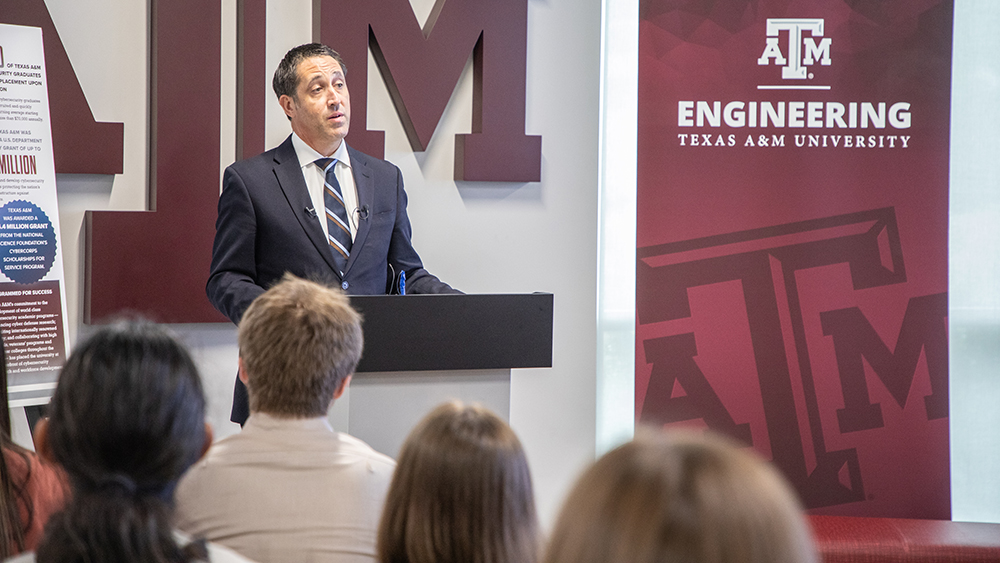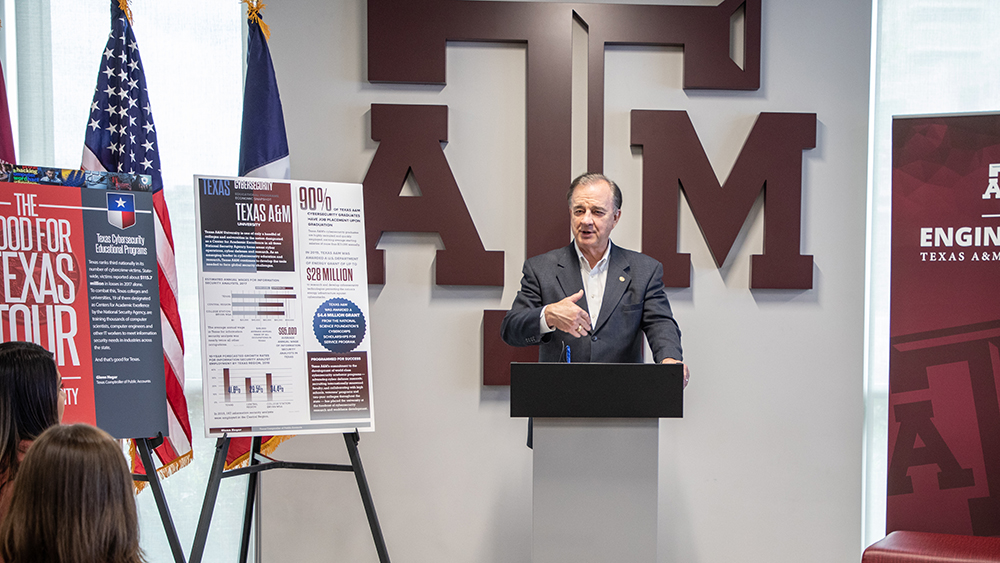
Cybercrime continues to increase around the country, and the state of Texas has been hit particularly hard this year. In August, 22 cities across the state were hit in coordinated ransomeware attacks. When cities near College Station were impacted, local officials turned to the cybersecurity experts at The Texas A&M University System who contributed their skill sets as a part of response efforts by the Texas Division of Emergency Management. That’s why Texas Comptroller Glenn Hegar stopped by Texas A&M as part of his Good for Texas Tour: Cybersecurity Edition.
The purpose of the tour is to highlight the impact of Texas colleges and universities in the fight against cybercriminals. According to a study released by Office of the State Comptroller of Public Accounts, in 2017 Texas ranked third among states in the number of cybercrime victims and second in the number of financial losses as a result.
“As an emerging leader in cybersecurity education and research and workforce development, Texas A&M Engineering continues to develop the tools needed to face global security challenges,” said Hegar.
Texas A&M University has steadily been building its reputation in cybersecurity research, education and outreach over the past few years and is one of only a handful of colleges and universities in the nation designated as a Center for Academic Excellence in all three National Security Agency focus areas: cyber operations, cyber defense and research.
The Texas A&M College of Engineering is also educating the next generation of cyber warriors as part of its Master of Engineering in Engineering degree with a specialization in cybersecurity. The degree program gives graduates a unique skill set within the engineering workforce — empowering them to anticipate, identify, assess and mitigate threats to cyber systems. They can also receive an industry-recognized certification.
Combined, the degree and certification elevate students to highly qualified job candidates as they pursue careers post-graduation. The degrees and certifications conferred are regularly reported to the Texas Higher Education Coordinating Board as metrics for its “60x30TX Plan,” which has a goal of at least 60% of Texans between the ages of 25-34 having a certificate or degree by 2030.
Graduates from any Texas A&M academic or professional training program in cybersecurity are highly recruited, with 90% of graduates accepting jobs upon graduation. These students are very marketable after graduation, due in part to the in-depth, on-the-job training they receive as students.
“The Texas A&M College of Engineering’s research, curriculum and workforce development programs are consistently recognized among the best in the nation in cybersecurity,” said Dr. M. Katherine Banks, vice chancellor and dean of Texas A&M Engineering. “Our reputation for excellence in this field will expand as we address the important national problems of cybersecurity in critical infrastructure and manufacturing.”
Cybersecurity experts across the Texas A&M System are frequently also sought after by government officials and peer institutions for their expertise. That expertise was lauded recently by FBI Director Christopher Wray, who praised Texas A&M for their outreach efforts in this important field during a U.S. Senate Committee on the Judiciary hearing in July.
Texas A&M’s reputation is also attracting cybersecurity heavyweights like Dr. Stephen Cambone, who joined the Texas A&M System in 2017 as associate vice chancellor for cybersecurity initiatives and is also a professor of practice in the College of Engineering. Cambone is the former U.S. Undersecretary of Defense for Intelligence and brings with him a wealth of global perspective in which knowledge or experience in the cybersecurity realm is pertinent for graduates to be best prepared for important jobs in either the public or private industry sector.
Earlier this year, the U.S. Department of Energy announced awards of up to $28 million as support for research, development and demonstration of next-generation tools and technologies that will improve the cybersecurity and resilience of the nation’s critical energy infrastructure, including the electric grid, as well as oil and natural gas infrastructure networks. Among the 11 teams to receive an award includes the Texas A&M Engineering Experiment Station (TEES), led by Dr. Kate Davis from the Department of Electrical and Computer Engineering.
Davis’s team from TEES will develop a next-generation secure energy management system that can detect malicious and abnormal events through a fusion of cyber and physical data and algorithms, effective integrated analytics, and visualization.

The Texas A&M System is also home to two research centers devoted to cybersecurity: the Texas A&M Cybersecurity Center and the TEES Center for Nuclear Security Science and Policy Initiatives.
During this visit, Comptroller Hegar toured several assets and met with many subject matter experts from across the Texas A&M System including Texas A&M’s West Campus Data Center; the Texas A&M System Security Operations Center and the College of Engineering’s Zachry Engineering Education Complex. Additionally, he spoke with current students who are employed at various cybersecurity-related offices and a group from the Texas A&M Corps of Cadets cyber corps.
“The Texas A&M System has some of the country’s best cybersecurity experts right here in the Brazos Valley,” said Chancellor John Sharp. “And that expertise has been recognized by the state and federal governments. Comptroller Hegar is working hard to make sure the citizens of Texas are protected against cybercrimes, and so are we. Together, we can help root out these cybercrimes before they happen.”